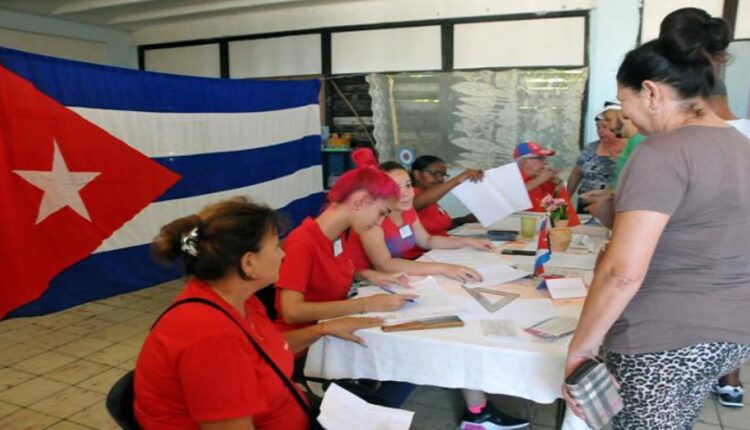
Cuba’s municipal elections (+Español)
On Sunday the 27th, municipal elections were held in the 23,480 polling stations set up in the Cuban archipelago.
The preliminary, official results are as follow: “Voters: 8,351,311. Voted: 5,728,220 (68.58%). Left Blank: 5.22%. Cancelled: 5, 67%”.
The official report does not reflect the number of ABSTENTIONS, therefore, using the calculator, we see that 2,623,091 (31.40%) compatriots did not bother to vote.
The number of abstentions, perhaps the highest in several elections held, reveals the growth of this trend. If we add to it the percentage of voting cards left BLANK, a vote whose manifestation can be interpreted as a radical break with the system or the dissatisfaction with the nomination process of the proposed candidates, or they simply show indifference – a difficult thing to believe with the country’s reality — would result in 36, 62%.
By comparison, previous municipal elections held in 2017, for example, saw voter turnout of 89 percent, which at the time was considered the lowest mark in 40 years.
The importance of this exercise, in addition to renewing and/or re-electing the delegates to the popular municipal powers, is that it allows us to interpret the behavior and attitudes within Cuban society at this time. Overwhelming participation no longer exists, despite the compulsive media campaigns.
In my case it clearly shows the extent of the discontent with the country’s situation and, for a considerable percentage of Cubans, it marks a perceptible distancing from official policy and/or the conduct of public affairs. Generally, estrangement precedes divorce, and this sample may contain both attitudes.
A surprise?
If this result yielded figures similar to other times, I would have questioned them. I think it is close to reality. In the past two years many things have happened in the country: the economic crisis, the energy crisis, a food crisis, inflation, protests with hundreds of prosecuted and sanctioned, in short, a social situation in critical condition. Are we witnessing a process of realignment in the social body?
The result of the municipal elections can give us an indication.
*****
Versión en Español:
Cuba, elecciones municipales
El domingo 27 fueron celebradas las elecciones municipales en los 23 480 colegios electorales habilitados en el archipiélago cubano.
Los resultados oficiales preliminares son los siguientes: “Electores: 8 351 311. Votaron: 5 728 220 (68,58 %) En Blanco: 5,22 %. Anuladas: 5, 67 %”.
El reporte oficial no refleja la cifra de ABSTENCIONES, por lo que, echándole mano a la calculadora, vemos que 2 623 091 (31,40 %) compatriotas no asistieron a los colegios.
La cifra de abstenciones, quizás la más alta en varios comicios celebrados, revela el crecimiento de esta tendencia. Si a ella agregamos los % en BLANCO, voto cuya manifestación puede interpretarse desde la radical ruptura con el sistema o la insatisfacción con el proceso de nominación de los candidatos propuestos, con algunos o alguno de los propuestos, o sencillamente muestran indiferencia –actitud difícil en nuestra realidad–, resultaría en un 36, 62 %.
En comparación, las elecciones municipales anteriores celebradas en 2017 vieron una participación electoral del 89 por ciento, que en ese momento se consideró la marca más baja en 40 años.
La importancia que reviste este ejercicio, amén de renovar y/o reelegir los delegados a los poderes populares municipales, es que permite aproximarnos a la conducta y actitudes dentro de la sociedad cubana en este momento. La arrolladora asistencia ya no existe, a pesar de las compulsivas campañas mediáticas.
Para mí evidencia claramente la amplitud del descontento con la situación y, para un por ciento considerable de cubanos, marca un perceptible distanciamiento de la política oficial y/o de la conducción de los asuntos públicos. Generalmente, el distanciamiento antecede al divorcio, y esta muestra puede contener ambas actitudes.
¿Sorprende?
Si este resultado arrojara cifras propias de otras épocas, habría que cuestionarlas a fondo. Pienso que se aproxima a la realidad. En dos años han ocurrido muchas cosas en el país: crisis económica, crisis energética, alimentaria, inflación, manifestaciones de protestas públicas con cientos de procesados y sancionados, en fin, una arquitectura social en estado crítico. ¿Asistimos a un proceso de realineamientos en el cuerpo social?
El resultado de las municipales puede darnos un indicio.

